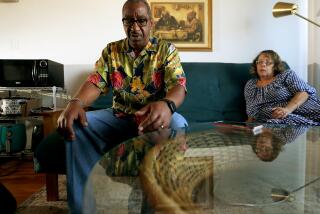Admissions scandal: Judge releases one parent from prison early due to coronavirus

- Share via
Imprisoned for conspiring to slip their children into USC as bogus water polo stars, a Napa Valley vintner and a Los Angeles water systems executive asked a judge last week to release them from custody early, citing the specter of the novel coronavirus.
Agustin Huneeus Jr., whose family owns several wineries in Napa, was discharged on March 17, two weeks before his five-month term was up, after U.S. District Judge Indira Talwani found that “extraordinary and compelling reasons” justified the early release.
Incarcerated in Lompoc, Devin Sloane, whose four-month prison term will end April 1, asked Talwani for similar relief and was denied. Even as she turned down the request, Talwani suggested that the process prisoners must follow to seek early release is ill-equipped to address a fast-moving crisis forced on the courts and prison system by the coronavirus outbreak.
Sloane, she wrote, failed to demonstrate he had appealed to the warden at Lompoc and exhausted all administrative means of securing an early release before appealing to the court. Nor had he shown a “life-threatening condition” that would allow him to bypass those avenues and go directly to the court, she wrote.
Talwani raised in her order what she called “a critical question”: Should Congress or President Trump give the courts or the Bureau of Prisons “greater flexibility” to truncate the prison terms of people imprisoned for nonviolent crimes who are nearing the ends of their sentences?
Amid a pandemic that has upended courts across the country and unnerved prisoners and their advocates, it is no surprise the coronavirus has affected the cases of dozens of parents charged with defrauding USC, Georgetown and other elite universities with rigged entrance exams, fabricated credentials and bribes.
But compared with the disarray brought on the criminal justice system writ large, the pandemic’s effect has been more blunted on the college admissions cases. Every defendant who has pleaded not guilty was allowed to post bond and remains out of custody ahead of trial. The first trial — which includes Lori Loughlin, her husband, J. Mossimo Giannulli, and six other parents — remains scheduled to begin Oct. 5.
It is unclear why Talwani rejected Sloane’s request while granting a similar one from Huneeus. Both men are first-time offenders, 54 years old and incarcerated for committing nonviolent crimes.
While Huneeus’ motion, like Sloane’s, was sealed to protect sensitive details about his health, Talwani cited both the coronavirus outbreak and the vintner’s “unique health circumstances” in ordering him released and committed to home confinement. Attorneys for Huneeus and Sloane didn’t immediately respond to requests for comment.
As of Monday, three inmates in the custody of the Bureau of Prisons have tested positive for COVID-19, according to the agency. Two are at a facility in Louisiana and a third is at the Metropolitan Detention Center in Brooklyn.
Toby Macfarlane, the only other parent charged in the case who is still incarcerated, has not requested an early release. The Del Mar insurance executive was sentenced to six months in prison for sneaking his daughter and son into USC as phony athletes. Macfarlane, 57, remains imprisoned at a federal facility in Tucson with a June release date, according to Bureau of Prison records. His attorney didn’t immediately respond to a request for comment.
A judge allowed Douglas Hodge, sentenced to nine months in prison for paying $850,000 in all to slip four children into USC and Georgetown as fake athletic recruits, to report to prison 45 days after his original surrender date.
Hodge, the former chief executive of Pimco, cited the pandemic as one reason for delaying his prison term. The Bureau of Prisons “is ill-equipped to respond to the COVID-19 pandemic and protect the health of incarcerated individuals,” his attorneys wrote, noting that Hodge, 62, is “at heightened risk for significant complications arising from contracting the virus.”
Hodge also asked to delay his surrender because federal prosecutors in Boston recently turned over notes that William “Rick” Singer, the Newport Beach consultant at the center of the admissions scam, wrote in his iPhone after he began cooperating with government agents.
In one note, Singer complained that an agent had yelled at him, insisting he “bend the truth” and describe the money his clients had paid him as bribes, not donations to university programs.
Defense attorneys have argued that these notes, only a handful of which have so far been publicly disclosed, will gut the government’s narrative that Singer and his clients were entangled in an unmistakably criminal conspiracy to commit fraud, bribery and money laundering.
More to Read
Sign up for Essential California
The most important California stories and recommendations in your inbox every morning.
You may occasionally receive promotional content from the Los Angeles Times.










